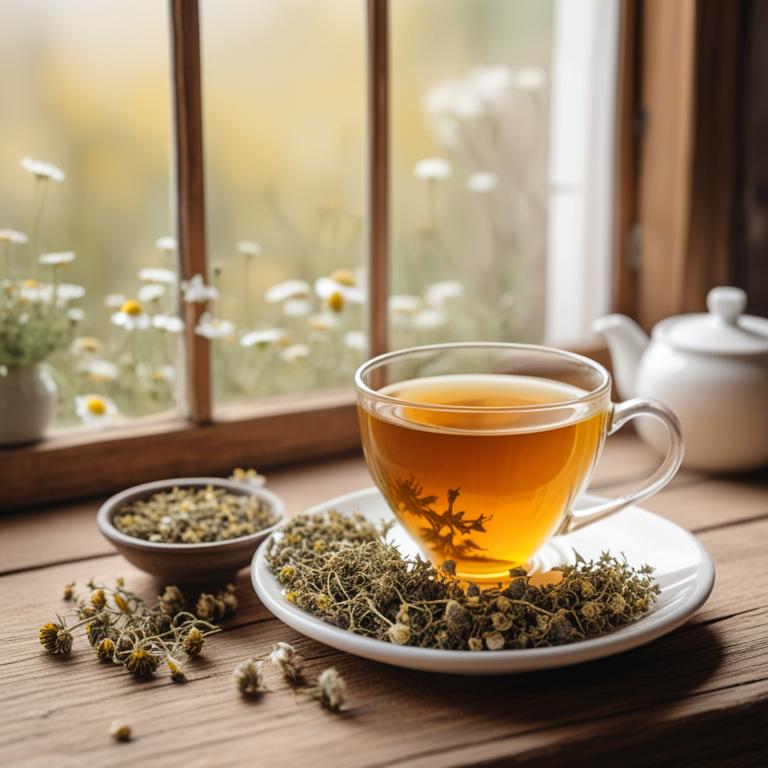11 Best Herbal Teas For Eczema

Herbal teas for Eczema are natural remedies made from plants and herbs that are used to treat and soothe the symptoms of eczema, a chronic skin condition characterized by dry, itchy, and inflamed skin.
These herbal teas have numerous benefits, including reducing inflammation, calming skin irritation, and promoting healing, making them a popular alternative to conventional medications.
Examples of herbal teas that can help alleviate eczema symptoms include peppermint tea, which cools and calms the skin, chamomile tea, which soothes and reduces inflammation, and calendula tea, which promotes healing and regeneration.
Additionally, other herbal teas such as lavender tea, green tea, and ginger tea have also been found to be effective in treating eczema due to their anti-inflammatory and antioxidant properties.
According to "Anti-inflammatory & anti-allergy agents in medicinal chemistry", teas for eczema that are rich in flavonoids, which exhibit anti-inflammatory properties, may be beneficial in reducing inflammation and irritation to the skin associated with eczema.
Below there's a list of the 11 best herbal teas for eczema.
- 1. Aloe barbadensis teas
- 2. Calendula officinalis teas
- 3. Chamomilla recutita teas
- 4. Lavandula angustifolia teas
- 5. Melissa officinalis teas
- 6. Urtica dioica teas
- 7. Avena sativa teas
- 8. Cassia alata teas
- 9. Echinacea purpurea teas
- 10. Hypericum perforatum teas
- 11. Lavandula latifolia teas
Also you may be interested in...
TODAY'S FREE BOUNDLE
Herb Drying Checklist + Herbal Tea Shopping List + Medicinal Herbs Flashcards
Enter you best email address below to receive this bundle (3 product valued $19.95) for FREE + exclusive access to The Aphotecary Letter.
$19.95 -> $0.00
1. Aloe barbadensis teas

Aloe barbadensis teas have been traditionally used to treat eczema, a chronic skin condition characterized by inflammation and dryness.
The anti-inflammatory and soothing properties of Aloe barbadensis teas help to reduce redness, itching, and swelling associated with eczema.
The bioactive constituents of Aloe barbadensis teas, including aloin, aloe-emodin, and vitamins A and E, contribute to its therapeutic effects by reducing inflammation, promoting wound healing, and protecting the skin from damage.
The benefits of Aloe barbadensis teas in treating eczema include reduced symptoms, improved skin hydration, and enhanced skin barrier function, making it a popular natural remedy for this condition.
Related Study
According to "Forschende Komplementarmedizin", Aloe barbadensis teas for eczema may be of value, but more controlled clinical efficacy studies and pharmacological studies are needed to prove their assumed effects and clarify their mechanisms of action.
2. Calendula officinalis teas

Calendula officinalis teas have been traditionally used to treat eczema due to their anti-inflammatory, antimicrobial, and antioxidant properties.
The bioactive constituents present in calendula, including triterpenoids, flavonoids, and carotenoids, help to reduce inflammation and promote wound healing, which are essential in managing eczema symptoms.
By reducing inflammation and preventing infection, calendula teas help to soothe and calm irritated skin, providing relief from eczema-related discomfort and promoting healthy skin regeneration.
The benefits of using calendula teas to treat eczema include reduced itching, redness, and swelling, as well as improved skin texture and appearance.
Related Study
According to "Phytomedicine : international journal of phytotherapy and phytopharmacology", Calendula officinalis teas for eczema may have anti-inflammatory effects, as demonstrated by its role in the three-herbs formula that significantly reduced the production of IL-6 and tumor necrosis factor (TNF)-α in human mast cells and inhibited the expression of pro-inflammatory cytokines in human keratinocyte cells.
3. Chamomilla recutita teas

Chamomilla recutita teas have been traditionally used to treat eczema due to their anti-inflammatory, antiseptic, and soothing properties.
The herbal preparation helps to treat eczema by reducing skin irritation, calming inflammation, and promoting wound healing, thereby providing relief from the symptoms of this ailment.
The bioactive constituents of Chamomilla recutita teas, including apigenin, luteolin, and chamazulene, exhibit anti-inflammatory and antioxidant effects that help to soothe and protect the skin.
The benefits of using Chamomilla recutita teas to treat eczema include reduced itching and redness, accelerated healing, and improved overall skin health.
Related Study
According to "BMC veterinary research", Chamomilla recutita teas, which is also known as Matricaria recutita L. or Chamomile, for eczema have been found to have antibacterial and antifungal effects, as well as wound-healing properties, making them a promising candidate to treat skin diseases in dogs.
4. Lavandula angustifolia teas

Lavandula angustifolia teas have been traditionally used to treat eczema due to their anti-inflammatory and antimicrobial properties, which help to reduce redness and itching associated with the condition.
The herbal preparation's soothing effects on the skin are attributed to its ability to modulate the immune system and reduce inflammation, making it a potential treatment option for eczema sufferers.
The bioactive constituents of Lavandula angustifolia, including linalool and linalyl acetate, have been shown to exhibit anti-inflammatory and antioxidant activities that contribute to its therapeutic effects on eczema.
The benefits of using Lavandula angustifolia teas to treat eczema include improved skin hydration, reduced itching and inflammation, and a decrease in the frequency and severity of eczema flare-ups.
5. Melissa officinalis teas

Melissa officinalis teas, also known as lemon balm tea, have been traditionally used to treat eczema due to their anti-inflammatory and antiseptic properties.
The bioactive constituents of Melissa officinalis, including rosmarinic acid and citral, help to soothe and calm the skin, reducing redness and irritation associated with eczema.
The antihistamine properties of Melissa officinalis teas also help to alleviate itching and discomfort, providing relief from eczema symptoms.
Regular consumption of Melissa officinalis teas has been found to promote skin health and reduce the frequency and severity of eczema flare-ups, making it a beneficial herbal remedy for managing this chronic condition.
6. Urtica dioica teas

Urtica dioica teas, derived from the leaves of the stinging nettle plant, have been traditionally used to treat eczema due to their anti-inflammatory, antioxidant, and soothing properties.
The herbal preparation helps to treat eczema by reducing inflammation, relieving itching and pain, and promoting skin regeneration.
Bioactive constituents such as flavonoids, phenolic acids, and mucilages present in Urtica dioica teas contribute to their therapeutic effects, including the reduction of histamine release and the improvement of skin barrier function.
The benefits of using Urtica dioica teas to treat eczema include reduced symptoms, improved skin health, and a decrease in the need for conventional medications.
Related Study
According to "Journal of pharmacy & bioallied sciences", Urtica dioica teas may help alleviate eczema symptoms due to their anti-inflammatory and antihistaminic properties, as demonstrated by the study's findings on mast cell stabilization and decreased paw thickness in an allergic inflammation model.
7. Avena sativa teas

Avena sativa teas have been traditionally used to treat eczema, a chronic inflammatory skin condition characterized by dry, itchy, and scaly skin.
The anti-inflammatory and soothing properties of Avena sativa teas help to calm and reduce the symptoms of eczema, making it an effective herbal remedy for this ailment.
The bioactive constituents of Avena sativa teas, including avenanthramides and ferulic acid, have been shown to possess antioxidant and anti-inflammatory properties, which help to reduce inflammation and promote skin healing.
Regular consumption of Avena sativa teas has been found to provide relief from eczema symptoms, reducing itching, redness, and dryness, and promoting overall skin health and well-being.
8. Cassia alata teas

Cassia alata teas have been traditionally used to treat eczema, an inflammatory skin condition characterized by redness, itching, and dryness.
The anti-inflammatory and antioxidant properties of Cassia alata teas help to reduce inflammation, soothe the skin, and promote healing, thereby providing relief from eczema symptoms.
The bioactive constituents of Cassia alata teas, including flavonoids and phenolic acids, have been shown to exhibit potent antioxidant and anti-inflammatory activities, which contribute to its therapeutic effects.
Regular consumption of Cassia alata teas has been found to reduce the severity of eczema symptoms, improve skin hydration, and promote overall skin health, making it a promising natural remedy for eczema treatment.
Related Study
According to the study, Cassia alata teas were successfully applied in treating infantile eczema and possibly other forms of eczema, indicating its potential use as a treatment for eczema.
9. Echinacea purpurea teas

Echinacea purpurea teas have been traditionally used to treat eczema, an inflammatory skin condition characterized by dry, itchy patches.
The anti-inflammatory properties of this herbal preparation, particularly its flavonoids and phenolic acids, help to reduce inflammation and soothe irritated skin.
Echinacea purpurea teas contain bioactive constituents such as alkylamides, caffeic acid, and chicoric acid, which have been shown to exhibit antioxidant and immune-modulating activities that aid in the treatment of eczema.
The benefits of using Echinacea purpurea teas to treat eczema include reduced inflammation, improved skin hydration, and enhanced immune function, making it a popular natural remedy for this condition.
Related Study
According to "Molecular nutrition & food research", Echinacea purpurea teas for eczema may be a safe option, as they appear to have a low potential to generate drug-herb interactions and there are no verifiable reports of drug-herb interactions with Echinacea purpurea products, although further testing is necessary.
10. Hypericum perforatum teas

Hypericum perforatum teas, also known as St. John's Wort tea, have been traditionally used to treat eczema due to their anti-inflammatory, antiseptic, and antioxidant properties.
The bioactive constituents of this herbal preparation, including hyperforin, hypericin, and flavonoids, help to reduce inflammation, soothe irritated skin, and promote wound healing, thereby alleviating eczema symptoms.
The antiseptic properties of St. John's Wort tea help to prevent infection and promote a healthy environment for skin repair, making it an effective remedy for treating eczema.
Regular consumption of Hypericum perforatum teas has been shown to provide long-term benefits in managing eczema symptoms and improving skin health.
Related Study
According to "American journal of clinical dermatology", Hypericum perforatum teas, along with other botanicals such as Mahonia, Glycyrrhiza, and traditional Chinese medicines, appear promising for the treatment of atopic dermatitis.
11. Lavandula latifolia teas

Lavandula latifolia teas have been studied for their potential in treating eczema, an inflammatory skin condition characterized by dry, itchy, and inflamed skin.
The anti-inflammatory and antiseptic properties of this herbal preparation help to reduce inflammation and prevent infection, thereby alleviating symptoms of eczema.
Bioactive constituents such as linalool and linalyl acetate in Lavandula latifolia teas have been found to possess calming and soothing effects, which can help to reduce itching and promote skin healing.
By incorporating Lavandula latifolia teas into their skincare routine, individuals with eczema may experience improved skin hydration, reduced inflammation, and enhanced overall skin health.